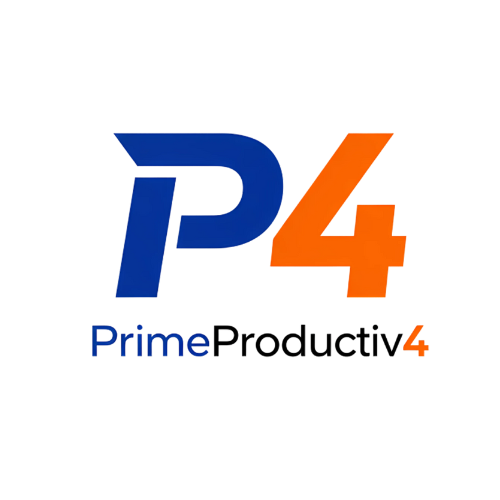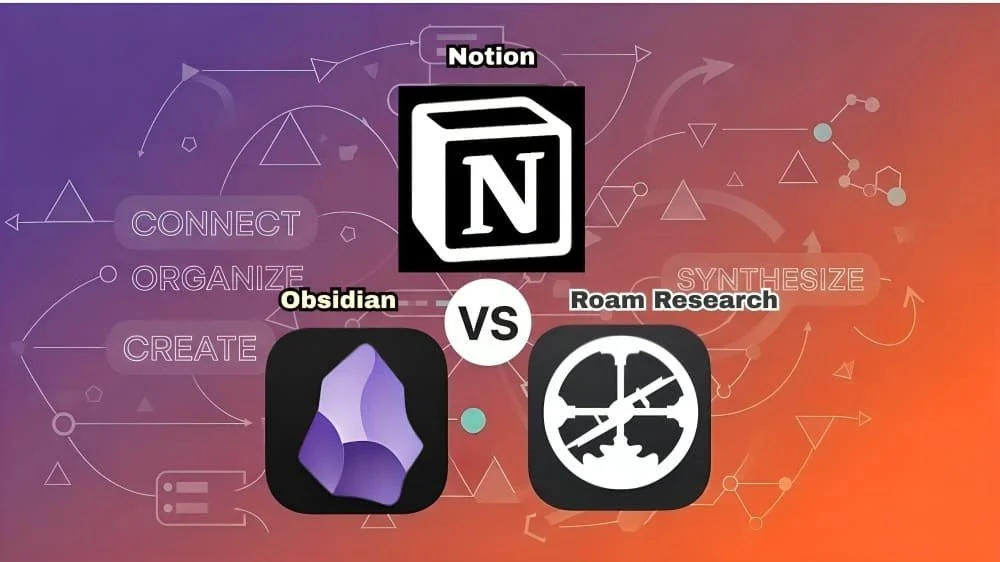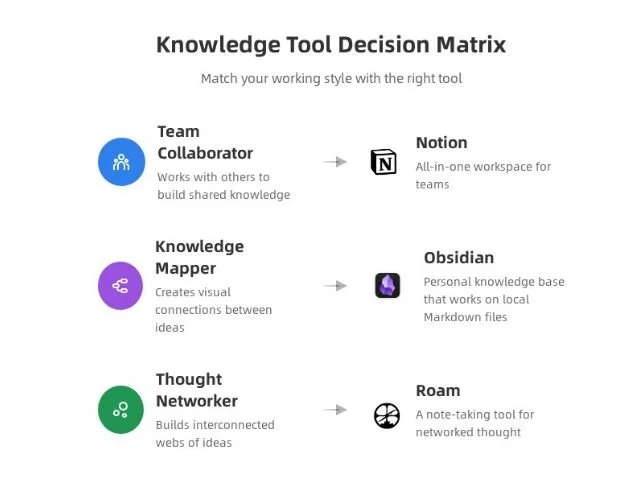Notion vs Obsidian vs Roam Research: The Note-Taking App That Actually Boosts Productivity (2025)
Let's cut through the productivity porn and get real for a second. You've probably downloaded more note-taking apps than you've had hot dinners this month. Each one promising to be the one—the magical solution that will finally organize your chaotic brain and transform you into that enviably efficient person who actually follows through on their ideas.
Spoiler alert: Most of them are digital snake oil.
But here's the thing—three apps have managed to rise above the noise and actually deliver on their promises. Notion, Obsidian, and Roam Research aren't just shiny productivity theater; they're legitimate powerhouses that have earned their cult followings through real-world performance.
The question isn't whether these apps work (they do), but which one aligns with how your brain actually operates. Because choosing the wrong one is like trying to drive a Formula 1 car to the grocery store—technically possible, but you're setting yourself up for frustration.
Notion vs Obsidian vs Roam Research Features Comparison Table
| Feature | Notion | Obsidian | Roam Research |
|---|---|---|---|
| 💰 PRICING | |||
| Free Plan | ✅ Generous free tier | ✅ Full features free | ❌ No free plan |
| Paid Plans | $12-$20/month | $5-$10/month | $15/month or $175/year |
| 🎯 CORE STRENGTHS | |||
| Best For | All-in-one workspace & teams | Knowledge mapping & research | Networked thinking & creativity |
| Primary Use Case | Project management + notes | Personal knowledge base | Research & idea connection |
| ⚡ KEY FEATURES | |||
| Organization Style | Block-based + databases | Folder + bidirectional links | Daily notes + block references |
| Linking System | Basic page links | ✅ Advanced bidirectional | ✅ Block-level linking |
| Visual Knowledge Map | ❌ No graph view | ✅ Beautiful graph view | ✅ Graph database |
| Team Collaboration | ✅ Excellent real-time | ⚠️ Basic sharing | ⚠️ Limited collaboration |
| 🔧 TECHNICAL ASPECTS | |||
| Data Storage | Cloud-based | ✅ Local files | Cloud-based |
| Offline Access | ❌ Limited offline | ✅ Full offline access | ❌ Requires internet |
| Mobile Experience | ⚠️ Decent but limited | ✅ Excellent mobile app | ⚠️ Basic mobile support |
| Customization | Template-based | ✅ 1000+ plugins | Limited themes |
| ⚖️ PROS & CONS | |||
| Main Advantage | Swiss Army knife functionality | Powerful knowledge connections | Revolutionary thinking method |
| Main Drawback | Can become slow & complex | Steep learning curve | Expensive with no free tier |
| 🎯 BEST FIT | |||
| Ideal User | Teams & project managers | Researchers & knowledge workers | Academics & creative thinkers |
| Learning Curve | ⚠️ Medium | ❌ Steep | ❌ Very steep |
| Time to Value | ✅ Quick wins | ⚠️ 2-4 weeks | ❌ 1-2 months |
The Notion Empire: Jack of All Trades, Master of... Everything?
Notion is a versatile platform that goes beyond basic note-taking. It's your digital Swiss Army knife for organizing thoughts, tracking progress, and managing projects. And honestly, calling it just a "note-taking app" is like calling Jeff Bezos "a guy who sells books."
Notion's superpower lies in its block-based architecture. Everything—text, images, databases, calendars, kanban boards—exists as moveable blocks you can arrange like digital Lego pieces. Want to embed a spreadsheet inside your meeting notes next to a video and a progress tracker? Notion doesn't even blink.
Where Notion Shines:
Team collaboration: Notion is excellent for structured knowledge management, collaboration, and project management. This makes it the ideal choice for users who need to work collaboratively on documents or projects.
All-in-one workspace: Why juggle fifteen apps when one can handle everything from project management to personal journaling?
Template ecosystem: Thousands of pre-built templates for everything from habit tracking to business planning
Database functionality: Create relational databases that would make Excel weep
Templates save lives! Notion’s single best feature? Automating recurring notes. If you want a ready-to-edit productivity template, grab my Free Remote Worker’s Daily Rhythm Template.
Where Notion Stumbles:
Performance issues: Large databases can feel slower than your grandmother's dial-up connection
Overwhelming customization: Notion has a particularly high risk of falling into the customizing/procrastination trap because you can design so much with What You See Is What You Get (WYSIWYG) features.
Mobile limitations: The mobile experience feels like a consolation prize compared to the desktop version
Pricing: Free for personal use with generous limits, $12/month for Pro, $20/month for teams not billed annually
But (and it’s a big one): Notion can be slow with huge databases, and if you’re offline, good luck opening last night’s life-changing idea. (Curious how the features stack up side-by-side? See this deep dive comparison from Productive.io for a chart worth bookmarking.)
Obsidian: The Knowledge Cartographer's Dream
Notion vs Roam Research vs Obsidian - The battle lines are drawn. Three productivity giants face off in the ultimate note-taking showdown, each promising to revolutionize how you capture and connect ideas. But which one actually delivers on the hype?
If Notion is the Swiss Army knife, Obsidian is the precision scalpel. Obsidian focuses on creating interconnected knowledge, and it does this better than any other app on the planet.
Obsidian treats your notes like a brain—everything connects to everything else through a beautiful web of bidirectional links. The killer feature? The graph view that literally shows you the neural network of your thoughts. It's like having an MRI of your own mind.
Where Obsidian Dominates:
Local storage: Obsidian stores all data locally and offers encryption for protection, providing users with a more secure environment compared to Roam's cloud-based system.
This local storage advantage becomes especially crucial for professionals managing chronic conditions who need reliable, accessible productivity systems. For a complete workspace setup that complements these digital tools, check out our Remote Work Productivity Setup for Chronic Illness: MS-Tested Home Offices.
Customization heaven: Obsidian offers a library of nearly 1,000 extensions for customization, allowing users to tailor the software to their specific needs
Markdown mastery: If you love writing in Markdown, Obsidian feels like coming home
Graph visualization: See the connections between your ideas in stunning visual networks
Performance: Blazingly fast, even with thousands of notes
Where Obsidian Gets Complicated:
Learning curve: Some users find its learning curve steep
No built-in sync: You'll need to use their sync service ($8/month) or set up your own solution
Intimidating for beginners: The power comes with complexity
Pricing: Free for personal use, $10/month for sync - not billed annually, additional costs for commercial use.
Roam Research: The Thought Network Revolutionary
Roam Research walked into the note-taking party fashionably late and immediately became the most interesting person in the room. Roam Research uses a DAG structure for flexible information organization, which sounds technical but is actually revolutionary.
Instead of organizing notes in folders or hierarchies like every other app since the dawn of computing, Roam lets your thoughts exist in a fluid network where any idea can connect to any other idea. Instead of organizing notes in a linear or hierarchical system, Roam mimics the way the human brain makes connections between ideas and concepts.
Where Roam Revolutionizes:
Bidirectional linking: This feature enables users to establish connections between different notes and topics bidirectionally, enhancing the coherence and discoverability of information.
Block-level references: Link to specific paragraphs, not just entire notes
Daily notes: Start fresh every day while maintaining connections to your knowledge base
Emergent organization: Your system organizes itself through use, not upfront planning
Where Roam Struggles:
Pricing shock: Roam Research offers a single pricing plan at $15/month or $175/year with 30-day trial
Interface learning curve: Despite this, newcomers may feel overwhelmed by Roam's interface at first glance
Limited formatting: If you need rich text and multimedia, Roam feels constrained
Pricing: $15/month or $175/year with a 30-day trial. No free tier, which is either confident or audacious depending on your perspective.
Knowledge explorers who live for connections, atomic notes, and never want to lose a fleeting idea again. For productivity nerds with FOMO, this article at Deliberate Diligence is a must-read.
The Productivity Reality Check: Which App Actually Delivers?
Decision matrix visualization with three pathways leading to different user types. Visual flowchart style showing 'Team Collaborator → Notion', 'Knowledge Mapper → Obsidian', 'Thought Networker → Roam'.
Here's what the productivity gurus won't tell you: the best app is the one you'll actually use consistently. But let's get more specific than that fortune cookie wisdom.
Choose Notion if:
You need one app to rule them all
Team collaboration is crucial
You love building systems and don't mind spending time on setup
Budget-friendly options matter to you
Choose Obsidian if:
You're building a long-term knowledge base
Privacy and local storage are non-negotiable
You enjoy customizing your tools
You think in connections and relationships
Choose Roam if:
You're a researcher, writer, or creative thinker
Emergent connections between ideas matter more than rigid organization
You don't mind paying premium prices for premium functionality
You want to think differently about how thoughts connect
Want an even deeper take? Check out this thorough 2025 review at TechBullion for additional pros, cons, and community opinions.
The Uncomfortable Truth About Note-Taking Apps
Here's the reality check nobody wants to give you: switching apps won't magically make you more productive. As long as you get the job done, I don't think you should worry about what kind of tools you are using. Who cares?
The secret sauce isn't in the app—it's in developing consistent habits around capturing, processing, and acting on information. The best productivity system is the one you actually stick with for months, not weeks, not days.
That said, using the wrong tool is like trying to eat soup with a fork. Technically possible, but why make life harder than it needs to be?
Discover more in-depth tips here.
The Final Verdict: Stop App-Hopping and Commit
After testing all three apps in real-world scenarios with actual projects (not just playing around during free trials), here's the bottom line:
Notion wins for teams and all-in-one workspaces. If you need collaboration features and don't mind some performance trade-offs, Notion is your best bet. The ecosystem is mature, the community is massive, and the feature set keeps expanding.
Obsidian dominates for individual knowledge workers. If you're building a personal knowledge management system and privacy matters, Obsidian is unmatched. The local storage and customization options make it future-proof.
Roam excels for creative and research work. If your work involves complex, interconnected thinking and you need to see unexpected connections between ideas, Roam's unique approach justifies the premium price.
The real productivity hack? Pick one based on your primary use case, commit to it for at least three months, and resist the urge to app-hop when the grass looks greener elsewhere.
Because at the end of the day, the best note-taking app is the one that gets out of your way and lets you focus on what actually matters: your ideas.
If you want my full system (schedules, guides, and my step-by-step routine), check out my premium 66-page Daily Rhythm Template for Remote Workers.
FREQUENTLY ASKED QUESTIONS
Can I import my notes from one app to another?
Yes, but with varying degrees of pain. Notion and Obsidian both support Markdown export/import, making transitions easier. Roam's export options are more limited. Plan for some manual cleanup regardless of which direction you're moving.
Which app works best offline?
Obsidian wins this hands-down since it stores everything locally. Notion requires an internet connection for most features, while Roam is primarily cloud-based. If offline access is crucial, Obsidian is your only real option.
Is the learning curve worth it for these advanced apps?
It depends on your needs. If you're taking simple notes occasionally, stick with Apple Notes or Google Keep. But if note-taking is central to your work or studies, investing time in learning these tools pays dividends long-term.
Can these apps replace traditional project management tools?
Notion can definitely replace many project management tools, especially for smaller teams. Obsidian and Roam are better suited for knowledge management than project management, though both can handle basic task tracking.
Can these apps help with ADHD or brain fog?
Absolutely—template customization, structure, and workflow options all help. These apps' organizational features can be game-changers for managing cognitive challenges. For more specialized tools and strategies, see our comprehensive Brain Fog Survival Kit: 5 Best Apps for MS & Chronic Illness. Also, try the Focus Session Timer Guide for an extra productivity boost.
Which app is best for students?
Obsidian is excellent for research-heavy fields where connecting concepts matters. Notion works well for students who need to manage classes, assignments, and notes in one place. Roam is powerful for graduate-level research but might be overkill for most undergrad needs.
How do these apps handle privacy and data security?
Obsidian stores everything locally, giving you complete control. Notion and Roam are cloud-based, with standard encryption and privacy policies. If data sovereignty is critical, Obsidian is the clear choice.
Can I use multiple apps together?
Absolutely, and many power users do. A common approach is using Notion for project management and team collaboration while using Obsidian or Roam for personal knowledge management. The key is avoiding duplication and confusion.
External Trustworthy Links
Productive.io: Notion vs Obsidian (Feature Comparison, 2025)
TechBullion: Ultimate Knowledge Management Review (Notion, Obsidian, Roam)
Deliberate Diligence: The Best Note-Taking Apps for a Productivity-Driven Lifestyle


